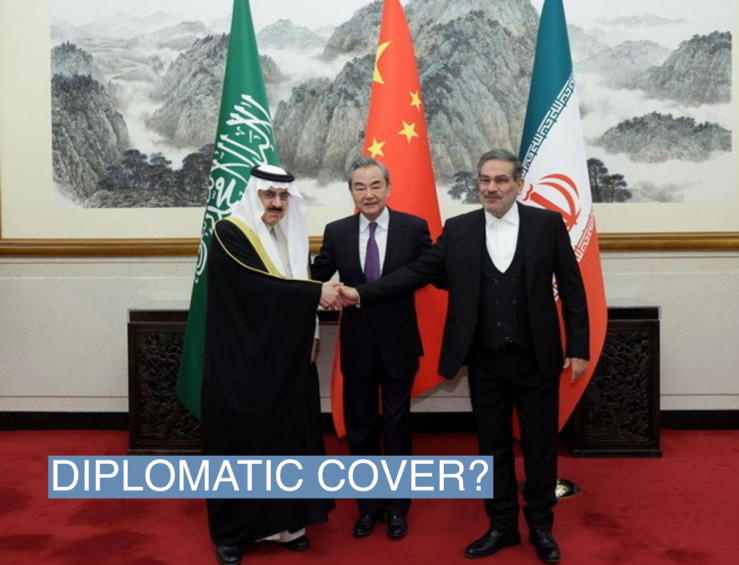The Scoop
The landmark deal brokered by China this month to normalize relations between Saudi Arabia and Iran could dramatically reduce tensions in the Middle East — but it purposely omits the growing nuclear programs and ambitions of Tehran and Riyadh.
That omission, said Mideast and Western officials, could further fuel a trend of nuclear proliferation that’s already on the march globally.
“This deal doesn’t focus on the nuclear issue at all,” said a Mideast official. “It’s about reducing tensions and investment.”
Iran is on the cusp of producing weapons-grade uranium, according to the U.N.‘s nuclear watchdog, and could generate enough fissile material for a few bombs in just months. Saudi Arabia, meanwhile, has said it plans to domestically produce nuclear fuel for energy purposes, but which could also be used for weapons.
Chinese officials told Semafor that, separate from the deal’s terms, Beijing still intends to use its growing influence with Iran and Saudi Arabia to curb the spread of nuclear weapons and underpin the U.N.’s Nuclear Nonproliferation Treaty. They noted that Beijing helped negotiate the 2015 JCPOA agreement that placed curbs on Tehran’s program until former President Donald Trump ended U.S. participation in 2018.
“China’s unwavering goal is to uphold the international nuclear non-proliferation regime and peace and stability in the Middle East,” said Liu Pengyu, spokesman for Beijing’s embassy in Washington. “China will work with other parties to the JCPOA to continue advancing the political and diplomatic settlement of the Iranian nuclear issue.”
Jay’s view
U.S. and Middle East officials said Iran’s almost total economic and diplomatic reliance on China gives Beijing immense leverage to pressure Tehran against advancing its nuclear program further. But what’s unclear, they said, is whether Beijing truly seeks to be a guarantor of security in the Mideast and Persian Gulf, as Washington has attempted to do for decades.
“China was certainly a facilitator of this agreement, but judging by the terms, it did not provide much input,” said Emile Hokayem, who directs Mideast security studies at the International Institute for Strategic Studies in London. “The bigger question is whether it will take responsibility for its implementation.”
It’s also unclear whether China believes its interests are best advanced by deterring Tehran’s military ambitions, given its shared desire to diminish U.S. power globally.
Know More
China stunned many Western capitals on March 10 when it announced it had brokered a rapprochement agreement between Iran and Saudi Arabia, two countries that have been on opposing sides of Mideast conflicts in Yemen, Lebanon, and Iraq. The deal sets a two-month period during which they’ll re-establish embassies shuttered since 2016. They also agreed to begin implementing previously signed trade and security agreements and to respect each other’s “sovereignty” and “internal affairs of states.”
“The three countries expressed their keenness to exert all efforts towards enhancing regional and international peace and security,” the agreement reads.
The most important parts of the deal are not spelled out in this text, however, according to these Mideast officials, and include specific security commitments. Iran, for one, pledged to stop arming Houthi militants in Yemen, who launched missile strikes on Saudi oil fields in 2019. Riyadh, in turn, said it would pull back support for anti-Iranian militias and media organs, whom Tehran believes has fueled nation-wide protests inside Iran since the fall.
Commitments weren’t made on Iran’s and Saudi Arabia’s nuclear programs, according to these officials.
The View From Washington & The West
The U.S. and European governments welcomed the Beijing Agreement as a development that could ease some of the Mideast’s worst conflicts. The Biden administration has helped broker a ceasefire in Yemen between the Saudi-backed government and the Houthis. U.S. officials hope they can now convert this into a permanent peace agreement. “Anything that can help reduce tensions, avoid conflict, and curb in any way dangerous or destabilizing actions by Iran is a good thing,” U.S. Secretary of State Antony Blinken said.
Still, there is concern in Washington about the nuclear proliferation implications of the deal. Tehran immediately has a pathway out of its diplomatic and economic isolation, and fewer incentives to cooperate with U.N. inspectors and curb its atomic work. China and Saudi Arabia have both pledged to increase investments in Iran as part of the deal.
Saudi Arabia’s tilt towards China could also impact Riyadh’s own nuclear plans. The Saudis have been seeking U.S. nuclear assistance for years, but successive U.S. administrations have demanded Riyadh not produce its fuel domestically, due to the security risks. China isn’t expected to require such restrictions and is already helping Saudi Arabia build its nuclear infrastructure.
Iran’s mission to the U.N. didn’t respond to requests for comment.
The View From Israel
Israeli officials are concerned Iran could use the Beijing Agreement as a shield for its nuclear program. China often votes in tandem with Russia at the U.N. Security Council and, therefore, is unlikely to act against Iran there, particularly after the agreement. Israel, meanwhile, would likely need to use Saudi airspace if it seeks to unilaterally strike Iran’s nuclear infrastructure, as Netanyahu has suggested it might.
“The Saudi-Iran normalization deal could make an Israeli strike …more difficult if Riyadh denies access to their airspace to Israeli jets to avoid both Iranian and Chinese retribution,” said Mark Dubowitz, president of the Foundation for Defense of Democracies think tank, who’s discussed Iran with Israeli and Saudi officials recently.
Room for Disagreement
Not everyone in the Middle East is pessimistic about the prospects for the Beijing-brokered deal. Iran’s dependence on China means it risks serious economic and diplomatic isolation if it breaches the pact or takes aggressive steps on the nuclear front. China has invested its prestige in its diplomacy, some diplomats argue, and is incentivized to make sure Iran follows through.
Saudi officials have also told the Biden administration that they’re not seeking to break from the Washington-Riyadh security alliance, nor threaten the Nuclear Nonproliferation Agreement.
“The Saudis are independent actors that are open to dealing with multiple great powers rather than just one in order to protect their interests,” said Mohammed Alyahya, a Saudi scholar at Harvard’s Belfer Center.
Notable
- The response to the Beijing Agreement among Middle East analysts has been a mix of shock and considerably less awe.
- The Institute for Science and International Security argues Iran’s nuclear program is designed to produce weapons “on demand.”
- The Saudi-watcher Karen Elliott House (my former boss at the WSJ) wrote a balanced account of the deal from Riyadh.


